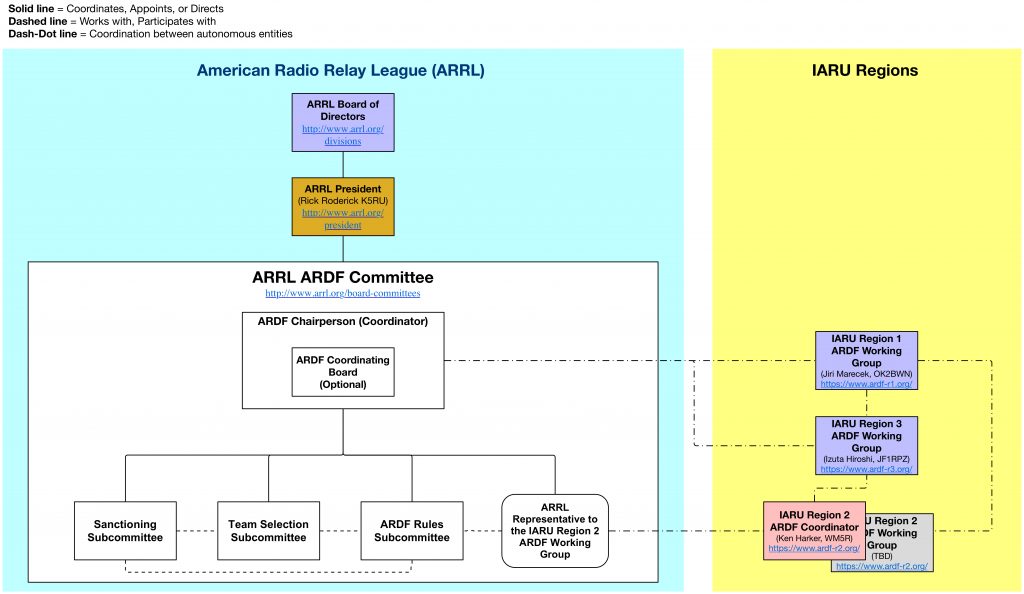The ARRL Programs & Services Committee has approved the creation of a permanent committee for the administration of Amateur Radio Direction Finding (ARDF) in the USA.
Confirmation from Great Lakes Division Director Dale Williams, WA8EFK, Chairman of the Programs & Services Committee states: “You may feel free [to] move forward on implementing the revised TOR and HQ staff will follow through with the posting of the new TOR and/or any links to assist with the update.”
Some details remain to be worked out. But we can now be confident that the expanded ARDF committee and reforms to how it operates have received the necessary ARRL approval. We can move forward.
Foundational Document
ARRL AMATEUR RADIO DIRECTION FINDING (ARDF) COMMITTEE POLICY
AND TERMS OF REFERENCE
The Terms of Reference (ToR) document formally defines the purpose, responsibilities, and authority of the ARDF Committee.
A draft version of the ToR was approved by the ARRL Programs & Services Committee in July 2019, establishing the ARRL ARDF Committee – no longer is USA ARDF administered by a single (or dual) ARDF Coordinator.
Several versions of the ToR had been made available to the P&S Committee in the months leading up to its approval, and at the time of this writing, it is not clear exactly which version was approved. Differences between the versions were minor – but some questions remain about exactly what has been approved. It might be several months before the approved document is posted and the mystery is removed. We will move forward, but perhaps a bit cautiously on some fronts.
Committee Authority
The ARRL ARDF Committee derives its authority to administer ARDF from the American Radio Relay League (ARRL) as described in the ToR. The source of the ARRL’s authority is a little more complicated.
The International Amateur Radio Union (IARU) regional organizations are the ultimate authorities for administering the sport globally. There are three autonomous IARU regional organizations, and each one possesses the authority to define and administer the sport. All three exercise their ARDF authority differently. Visit this blog entry for more details and a diagram showing how they interact.
IARU Region 1 (Europe, Africa, Middle East & Northern Asia) follows a well-established, organized and somewhat bureaucratic approach. IARU Region 3 (Asia-Pacific) follows a similar approach to Region 1, but with less rigor and less organization.
IARU Region 2 (North and South America) has defined ARDF and appointed an ARDF Coordinator to help monitor and promote it. But Region 2 has not established an ARDF Working Group to administer ARDF. In the absence of a working group, IARU Region 2 exercises no meaningful control over the sport.
In the absence of Region 2 regulation of ARDF, the ARRL may apply any standards or rules it deems appropriate to those competitions it sanctions. The ARRL is also able to exercise the authority afforded to outside member societies by other regions.
ARDF Committee Presentation
At the 19th USA ARDF Championships held in Raleigh, NC August 1-4, 2019 a meeting was held for those interested in participating on the ARRL ARDF Committee. The presentation covered a brief history of the sport and an overview of how the committee fits into the larger ARDF administrative hierarchy. The materials presented at that meeting can be downloaded from Google Drive. You will need to download the presentation and view it in OpenOffice or a compatible viewer in order for it to display properly.
About the ARRL ARDF Committee
The ARRL ARDF Committee is organized as illustrated in the following diagram.

Committee Member Requirements
The ARDF Committee Terms of Reference document stipulates that members of the ARRL ARDF Committee meet the following requirements:
- ARRL members (Full or Associate).
- Compete, organize, officiate, promote or support ARDF in the USA.
There is no requirement to hold an Amateur Radio License. All committee members are uncompensated volunteers. Subcommittee appointments are usually for a 2-year term.
Those interested in serving should contact the ARRL ARDF Committee.
